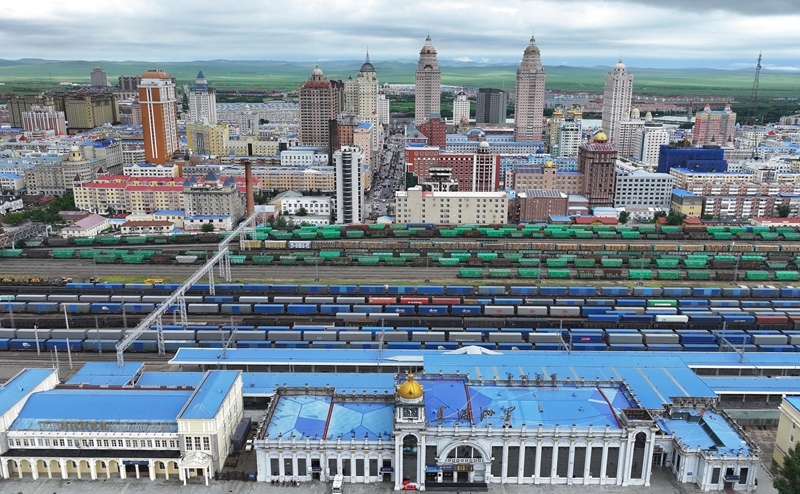EU and China: Partners or Rivals?

If the EU really seeks to redefine its role on the global stage with greater autonomy, it may find that stable, interest-driven cooperation with China is not just possible, but increasingly necessary.
Relations between the European Union and China are not as strong as they once were. The 27-nation bloc — whether acting under American pressure or voluntarily — is pressing Beijing to change its stance on Russia, while working to reduce what it sees as its own dependence on the world’s second largest economy.
Chinese leaders, on the other hand, insist that their country and the EU should uphold openness and cooperation and properly manage differences. As Chinese President Xi Jinping stressed during a meeting with top EU officials in Beijing on July 24, “reducing dependency” should not lead to reducing China-EU cooperation. Previously, in May, the Chinese leader said that this year’s 50th anniversary of diplomatic ties between China and the EU offered a chance to “properly handle frictions and differences, and open up a brighter future for China-EU relations.”
Chinese rhetoric, compared to that of European officials, sounds more conciliatory. Over the past few weeks, European Commission President Ursula von der Leyen has repeatedly criticized Beijing over various issues. On June 16, she accused China of having a “quasi-monopoly” on rare earths and “using this … not only as a bargaining chip, but also weaponizing it to undermine competitors in key industries.” She also blamed Beijing for “showing unwillingness to live within the constraints of the rules-based international system.”
More importantly, von der Leyen openly accused China of “de facto enabling Russia’s war economy,” while the EU imposed sanctions on two Chinese banks and five firms over the Ukraine crisis. Despite such moves and rhetoric, Beijing’s reaction was rather moderate. The Chinese Foreign Ministry issued a statement claiming that “some in the EU continue to exaggerate specific economic and trade issues and make groundless accusations against China on the Ukraine issue, causing unnecessary interference to China-EU relations.”
“We urge the EU to stop harming the lawful interests of Chinese companies without any factual basis,” Chinese foreign ministry spokesperson Guo Jiakun stressed on July 21.
This balanced statement signals that China is not interested in confrontation with the EU. Beijing views itself as a critical partner to Europe, not a systemic rival. From the Chinese perspective, disagreements should not lead to confrontation.
“The more severe and complex the international situation is, the more important it is for China and the EU to strengthen communication, increase mutual trust and deepen cooperation,” Xi said on July 24, welcoming von der Leyen and European Council President Antonio Costa in Beijing.
The problem, however, is that the EU seems to insist on divisions. Von der Leyen has warned Chinese leaders that relations between Brussels and Beijing are at “an inflection point.” At the same time, Costa called on China to “use its influence on Russia to respect the U.N. Charter and to bring an end to its war of aggression against Ukraine.”
However, not all EU member states agree with this view. Hungary, for instance, seeks to deepen China’s economic involvement in Europe, while its official stance on the Ukraine crisis aligns more closely with Beijing’s than with Brussels’. Both China and Hungary emphasize peace talks, a ceasefire and a diplomatic resolution to the conflict, whereas Brussels continues to advocate unilateral measures against Russia.

Economically, in 2024, Hungary and China elevated bilateral relations to an all-weather comprehensive strategic partnership for the new era. As a result, the Central European nation accounted for 31% of all Chinese foreign direct investment (FDI) targeting the EU and the United Kingdom in 2024, with Hungary alone receiving 62% of all Chinese electric vehicle-related FDI. Neighboring Slovakia appears to share the same ambition — to expand trade and investment ties with China while maintaining good political relations with Beijing. The landlocked country’s prime minister, Robert Fico, has openly supported China’s Ukraine peace plan while opposing EU tariffs on Chinese-made EVs.
The approach of these two EU members toward China suggests that, despite challenges, it is possible to expand economic and political relations between Europe and China. But how likely is that given the ongoing geopolitical circumstances, including U.S. President Donald Trump’s controversial tariff policy?
Trump’s return to the presidency in January has strained trans-Atlantic relations, with Europe facing increased pressure over defense, trade and shared values. It is no secret that his actions — including tariffs — have been very unpopular in Europe. But despite that, EU leaders do not use nearly as harsh rhetoric about Trump and the United States as they do regarding China.
Thus, the EU is unlikely to openly align with China in countering the Trump administration. Chinese leaders are fully aware of this, even though they would welcome a more strategically autonomous Europe. In this context, China views itself as a key economic partner to Europe, not a systemic rival.
In 2024, bilateral trade in goods between China and the EU reached $785.8 billion. The European grouping, however, remains concerned about the growing trade deficit. Still, one might ask: Is it fair to blame China when the EU has, over the years, effectively deindustrialized itself?
Now, Brussels appears to be pursuing protectionism in its trade relations with China, even as it champions free trade principles elsewhere. The EU continues to view Beijing as a partner, competitor and rival simultaneously — a strategy that seems unsustainable in the long run. As a result, Europe is likely to seek a new approach to managing its trade with China.
Trade was therefore at the top of the agenda at the China-EU summit in Beijing. While the relationship faces numerous challenges, there are also areas of cooperation. Together, the EU and China account for nearly 30% of global trade in goods and services and remain major economic partners.
Given that economic and trade cooperation has always been the cornerstone of China-EU relations, the future of their partnership will likely depend on both sides’ willingness to insulate pragmatic engagement from broader geopolitical tensions.
Finally, if the EU really seeks to redefine its role on the global stage with greater autonomy, it may find that stable, interest-driven cooperation with China is not just possible, but increasingly necessary.
Nikola Mikovic is a Serbia-based freelance journalist and political analyst.
 Facebook
Facebook
 Twitter
Twitter
 Linkedin
Linkedin
 Google +
Google +










